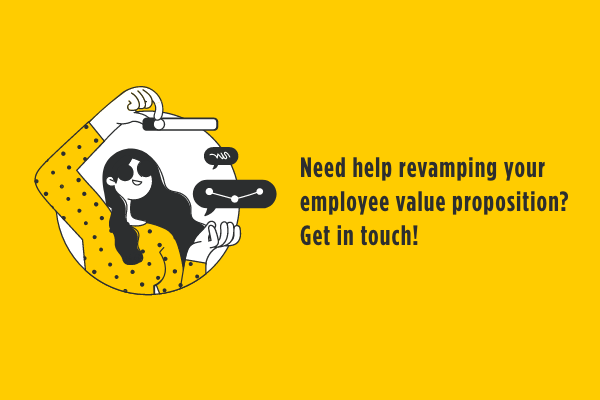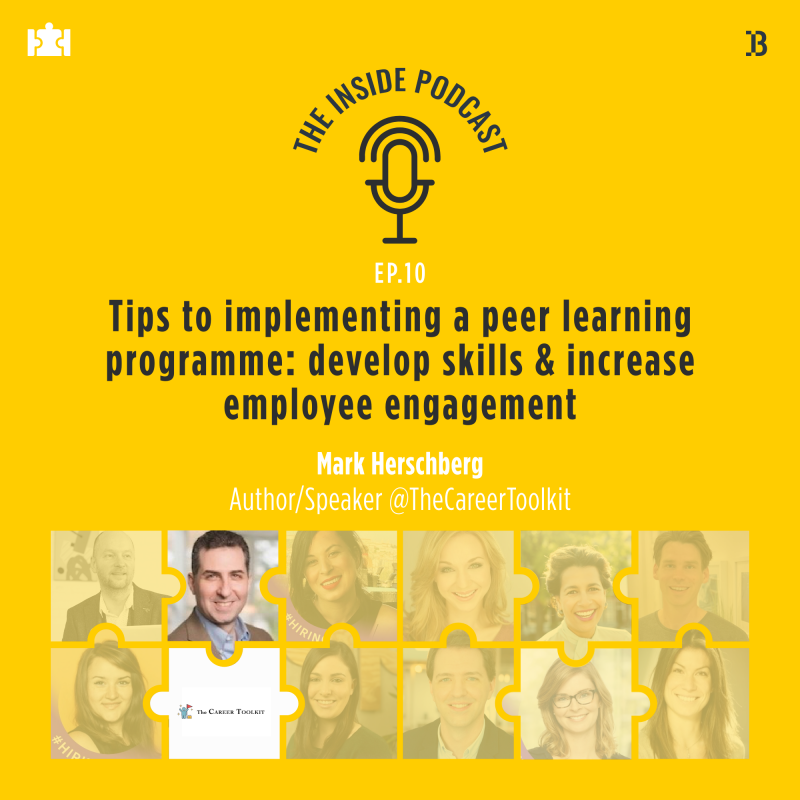Overview
We’re back with episode 10 of our Employer Branding: The Inside Podcast. This time around, we decided to switch things up a bit and approach the topic of employer branding from a different perspective. Meet our guest, Mark Herschberg, HR expert and author of the book The Career Toolkit. Throughout the podcast, we talked about skills that teams need to become more effective, but also about implementing a peer learning programme to develop and maintain employee skills and engagement within companies of all shapes and sizes.
What you’ll learn by listening
- Skills that make teams more effective
- Overcoming communication challenges within your organization
- What is peer learning & how it can help you be a better leader
- Developing skills & keeping employees engaged via peer learning
- Putting theory into practice – creating the same language within your organization to increase skills & maintain engagement
- The key to successful recruiting at the organizational level: Merging HR with sales and marketing
About the company
Networking, negotiating, communicating, leading, career planning — all skills critical to your career success. But did anyone ever teach these skills to you?
The Career Toolkit will help you master these vital skills and yield outsized returns for your career and your income. Every chapter is packed with dozens of actionable principles, exercises, and practices that will accelerate your success. It’s a multivitamin for your career!
The Career Toolkit shows you how to design and execute your personal plan to achieve the career you deserve. Including:
* Negotiating a job offer. (This alone will pay for the book.)
* Creating a dynamic career strategy.
* Building a high-value network.
* Developing the fundamental leadership skills that matter most.
* Managing teams effectively, even as an individual contributor.
Enjoy listening to Ep. 10!
Podcast transcription – Enjoy listening!
Georgiana: Hi everyone! This is Georgiana and you’re listening to Employer Branding: The Inside Podcast. And I’m super happy today to be talking to someone from the US, Mark Herschberg. I think you’re my first guest from the US, actually, Mark 🙂 He is talking to us today as a Human Resources Expert, author, consultant, and MIT graduate. Mark, welcome to our podcast! I’m really happy to have you.
Mark Herschberg: Thanks for having me. I’m excited to be here and glad to be your first US guest.
Georgiana: So Mark, you wrote this book recently, right? The Career Toolkit: Essential Skills for Success That No One Taught You. Who’s this book destined for? But actually, before that, maybe you can tell us more about what you do.
Mark Herschberg: Sure. I myself began my career back in the dot.com era in the 90s as a software developer. And I realised I wanted to become a CTO. But to do so there were a bunch of skills – I would need: leadership, communications, networking, negotiations. These were skills no one ever taught me. I had great computer science knowledge from MIT, but they don’t cover these skills in traditional education. So I had to teach them for myself. And in doing so I realised these skills aren’t just for me, they are for everyone on the team. My team would be better if everyone had these skills.
So I began to develop them with other people on my team, as well as myself. And around the same time, MIT had gotten similar feedback. Companies said these are the skills we want, not just from you, but from everyone and we can’t find them. And so we created a programme referred to as “MIT’s career success accelerator”. I helped develop that 20 years ago, I’ve been teaching there ever since. And I recently turned a lot of that plus some other content into the book that you mentioned. So now I have dual careers. I am a CTO, and typically the HR lead at my startup companies, because I’m doing all the hiring. But then I also do speaking and other work related to the book.
Georgiana: Wow, I have to say that’s a quite unusual combination of skills and roles. But I guess that’s what makes your career all the more interesting, right? And the contents of the book are all the more interesting. What’s this book for?
Mark Herschberg: The book is generally for workers ranging from about 20 to 40 years of age. If you’re a white collar worker working in an office place, this book is going to go through the skills that would help you; the secondary audience tends to be executives and HR folks who look at it and say, “This is the book I want to give to my team.” And in fact, on the website, there’s a whole development programme you can use, in which the book becomes a training programme for your company. So I’m seeing lots of companies, HR and executives who want to pick up the book for their whole organisation.
Georgiana: If you were to summarise this book, briefly, how would you do it?
Mark Herschberg: It covers 10 topics. With each topic, there is a mental shift. And then there are techniques for better executing. The topics are creating and executing a career plan, working effectively in the office – that includes managing your manager, understanding corporate culture, interviewing, not as a candidate, but from the hiring manager side, because so few of us are trained how to interview other people, leadership, the people side of management, the process side of management, communication, negotiation, networking, and ethics.
Georgiana: Right. And how would you say human resources can help develop these essential skills across an organisation?
Mark Herschberg: These are the skills that are going to make your team more effective. Think about all the communication challenges you have at your company. What if everyone got even just slightly better at communicating? What if you had a team of leaders instead of one person doing all the leading and everyone following. So you want to develop these skills across your team.
And the key thing is that these skills aren’t best learned by saying, “Go take some three day training class”. And then “Okay, you learn to be a leader, now you’re a leader forevermore”. These are skills you have to continually revise and practice. And so that involves HR creating a training programme, taking content and having discussions. And this, by the way, is the key to learning them. It’s small peer group discussions using peer learning.

So, create groups! I recommend groups of around six to eight people. But there are ways you can deal with larger groups with 20 or 40some people. And you have these groups cover a topic. Now the topic could be something from my book – read these pages, and then have that discussion. And in that discussion, if we’re talking about leadership, I might be facing a leadership challenge. And as I talked about, you’re going to offer ideas you’re gonna say, “Why is that a similar situation? Here are some thoughts”, and I’m going to learn from your experience and you’re going to learn from mine.
The key thing is that this is almost like a sport. More than a lecture. We’re used to lectures, we’re used to them. I went to school, I studied math, they gave me an equation, I memorised it. You can’t memorise an equation to be a leader. You can’t just say, here’s how to throw the basketball when you’re done. What do you do after you teach someone how to play basketball? You have them practice, you have them drill, you haven’t played scrimmage games.
That’s what this peer learning does, it gives them an opportunity to try some of this out. These techniques are used at the top business schools around the world, and how we teach this class at MIT. And there’s something you can create in your own organisation. And by the way, if you don’t want to use my book, you don’t have to. You can use any other book on leadership, on management, on negotiation on any of these topics, or use a great podcast like this one. Have your team listen to this podcast each week, and then have a discussion about that topic. You just need an initial source of content, and then have that discussion.
Georgiana: Mark, do you find that organisations are good at doing this? What’s been your experience so far?
Mark Herschberg: They are usually hesitant at first, because it’s not something that has been done before. It’s a new experience, because we are so used to saying, we’re going to send you to a two day seminar, they’re going to teach you and then you come back. Companies aren’t used to setting up their own internal training programme, saying “we are running this every other week, for 45 minutes, you’re going to meet in a group” – that is foreign to many companies. But once they do it, this has zero or near zero cost.
Maybe you’re buying copies of the book for people, but that’s pretty trivial. And it kind of runs itself, there’s not a lot of overhead, there’s not a lot of “Oh, I have to send people here or bring people in or spend money on things”. And so once it gets going, it is very easy to run. And you get a lot of secondary advantages. Not only are people developing skills, you have better engaged employees. And that’s going to help you with intention. You also have employees who are building up their internal networks, because they’re going to spend more time talking to people from different groups. And then finally, you create a common language.
So for example, if you use the book Good to Great. They talked about the hedgehog model. If everyone in your company has read that book, you can say, well, let’s just apply the hedgehog model. Oh right, hedgehog, good thinking! And everyone gets it. So you create a common language by having everyone go through the same content.
Georgiana: Would you say that the size of the company has anything to do with the way such a programme could be implemented? I’m thinking of the smaller to medium sized companies in which most of the time a Learning and Development Manager doesn’t exist, as opposed to the bigger companies? What would you say about that?
Mark Herschberg: That almost gives you an advantage. Because at the bigger companies where you have a Learning and Development Manager, that manager often feels pressure to do something big. I have to go find the best vendors, I have to bring in LMS, I have to use all these tools, and show a lot of motion to justify my being here. This is a low cost, low overhead programme and low cost not just in terms of money, but in terms of effort. You can divide up the team into these small groups and say “Here’s some content.”
And on the website, I have a free download that explains how to do it. It walks you through step by step, here’s how to divide up the teams. Here’s if you want to use my book, here’s how you divide that up for specific goals. What you need to do is meet every week or every other week or whatever schedule you want to use. And that’s it, that’s the minimum you need to do and you have a working programme. You can go a little further and say I’d like to get feedback from groups and just check in and make sure it’s working.
But it’s not a lot of effort. So for a full time HR person who is responsible for payroll and benefits and recruiting and everything else, and doesn’t have a lot of time, this takes very little time, once it’s implemented. It doesn’t even take that much to implement. And then once it is, it nearly runs on autopilot.
Georgiana: Have you seen it implemented by other departments as well?
Mark Herschberg: I’ve seen some companies where they say it’s not HR doing it. It’s actually an executive who said, “I love it, I want to make this happen”, for whatever reason, they don’t want to get HR involved. “So I’m buying copies for the 50 people on my team, and we are going to go through it ourselves.” And that’s it. You don’t need HR, because again, it’s not a super high overhead programme. So anyone can set this up and run this for a team.
Georgiana: How would you say such a programme can enhance employee engagement rates?
Mark Herschberg: We’re looking today at the great resignation. Everyone’s saying, Why am I at this job? What do I want out of life? And it’s not just a paycheck. And this is why we see so many employees looking for new work today, at least in the US. I know two out of three people are looking for work, looking to change jobs. I haven’t seen the data yet for Europe, but I suspect we’re seeing a similar spike. If you’re saying, “do this work, we’ll give you this paycheck”, that is not sufficient.
People need more. That more is going to be different for different people. For some, it’s flexibility. For others, it’s the nature of the work. But for many people, it is going to involve personal growth. “I want to feel like I’m moving forward, that I am advancing, I’m learning, I’m changing”. Now that may or might not be the primary motivator for everyone. But it will be on everyone’s list. And this low cost programme, that lets you basically create a way to engage your employees to say, “Look, we’re not just giving you a paycheck, we care about you, we care about developing you, and you’re getting something more from us than just money.” And that’s going to help employees want to stay and engage further with their co workers and with the company as a whole.

Georgiana: That’s actually quite useful, because we speak to a lot of employer branding managers and talent managers, both in Germany and in Romania. And everyone’s looking for as many new ways to engage employees as possible. And it’s hard. You know, when everyone’s working from home, it can be challenging. That’s what everyone’s telling me.
Mark Herschberg: One of the great things about this is it works just as well when remote, because we’re doing just a brief 45 minute discussion once a week. And you can do it by video if people are remote.
Georgiana: Absolutely. And, Mark, what kind of advice would you currently give to any employer branding or talent manager out there that’s struggling with recruiting or with retention in the company?
Mark Herschberg: I would say, understand your value proposition. You need to think about recruiting like marketing. And if you haven’t had conversations with your marketing department, now’s the time to start. Walk over to their office or call them up on zoom. And say, “I want to learn about marketing.” How do you think about marketing? You are marketing a product, your company, your roles. What is your value proposition? What is your catchy slogan? What is it that’s going to catch people’s attention? How are you going to sell them throughout the process? What is it that’s going to help you close?
So everything sales and marketing knows, you as an HR person, you can benefit from that and apply those techniques as you’re trying to recruit and retain employees. And you will see an advantage. If you’re finding “Well, I don’t have anything good”…If you said, “Hey, I’m a car company, and we just have a car”, you can’t just market “we’re a car”, you have to market “we’re a sports car”, or we’re the safe car or the value car. You can’t just say I’m just another car. So if you’re sitting at your company, well, I don’t know, we’re just another company and this software. Okay, that’s not enough.
Are you the company that helps people solve this problem? Are you the company that improves outcomes for that group of people? Figure out what it is your company does that will make people excited to work there. Maybe it’s your culture, maybe it’s a product you’re building? Maybe it’s that you do have great internal training. But if you don’t have something initially, come up with something because you can’t just sell the generic product.
Georgiana: Indeed, Mark, I need to ask you the question that I asked all of my guests when we reach the end of the podcast, and that question is the following: what’s the one book that you would say has been super helpful in what you’re doing right now?
Mark Herschberg: I would say, other than my own, which would be a little self-serving, Peopleware by Tom DeMarco and Timothy Lister. And in that book it’s technically a book about managing software teams. There’s not a line of code in it. And they basically opened my eyes early in my career that most problems, even in tech companies, are people problems, not technological problems. If you fix people’s problems, life gets easier.
Georgiana: That’s where you come in, right? With both with the expertise from both worlds. One last question, how can people reach you?
Mark Herschberg: You can go to my website, www.thecareertoolkitbook.com. There you can learn more about the book and get in touch with me, follow me on social media. You can also go to the resources page and download the free guide “The career toolkit development guide.” And that’s going to help you build this programme. There’s that and a whole bunch of other free resources on the website, all of this at the career toolkit book.com
Georgiana: That’s where you also purchase the book, I guess.
Mark Herschberg: From there, you can go to Amazon or other places where you can find the book.
Georgiana: Got it. Mark, this has been really nice. I enjoyed our discussion today. Thank you so much for talking to me. And I wish you good luck.
This was Employer Branding: The Inside Podcast. You can find our podcasts on Spotify on Apple podcasts and content on employer branding-related things on employerbranding.tech. Until the next time, stay tuned.






